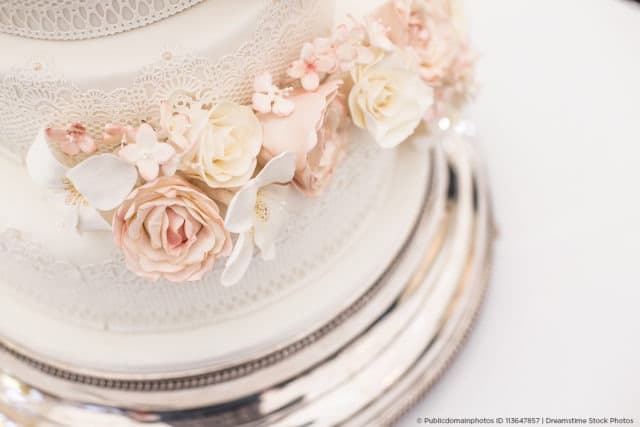
Shockingly, few cases are litigated all the way through the Supreme Court of the United States. In fact, in the 2017-18 Court Term, the Supreme Court decided to hear only 71 cases. So, the fact that a dispute over a wedding cake could be one of those few cases considered this year by the highest court in the land may seem surprising.
In reality though, the wedding cake dispute was a perfect case for the Supreme Court to consider because it involved a clash of two important constitutional issues, the rights of states to pass anti-discrimination laws to protect gay couples in the exercise of their civil rights versus the rights of an individual to enjoy his First Amendment rights to Free Exercise of Religion.
The Facts of the Same-Sex Wedding Cake Dispute
Jack Phillips is a devout Christian who has owned and operated Masterpiece Cake Shop in a suburb of Denver, Colorado, for many years. His shop offers a variety of baked goods, including custom wedding cakes. Phillips is also a devout Christian who believes that his religion dictates that marriage is and should be the union of one man and one woman.
Charlie Craig and Dave Mullins are a gay couple who lived in Colorado. In 2012, Colorado did not recognize same-sex marriages, so they planned to legally wed in Massachusetts and then celebrate the marriage with family and friends in Denver.
The couple visited Masterpiece Cake Shop in the summer of 2012 and asked Phillips to design a wedding cake for them. Phillips refused, stating that he would not create wedding cakes for same-sex weddings. Phillips later explained that he believed that creating a cake for a same-sex wedding goes against the teachings of the Bible and would be a personal endorsement and participation in something that he was opposed to on religious grounds.
The Anti-Discrimination Law and Litigation
In 2012, Colorado had a law prohibiting discrimination in public accommodations called the Colorado Anti-Discrimination Act (CADA) which stated:
It is a discriminatory practice and unlawful for a person, directly or indirectly, to refuse, withhold from, or deny to an individual or a group, because of a disability, race, creed, color, sex, sexual orientation, marital status, national origin, or ancestry, the full and equal enjoyment of the goods, services, facilities, privileges, advantages, or accommodations of a place of public accommodation.
CADA defined “public accommodations” broadly to include any “place of business engaged in any sales to the public…”
After Phillips refused to create their wedding cake, Craig and Mullins filed a discrimination complaint alleging that they were denied full and equal service to the bakery because of their sexual orientation.
The Commission investigated and held hearings (which involved some statements which became fateful in the case), and it was ultimately decided that Phillips’ actions constituted prohibited discrimination on the basis of sexual orientation.
The First Amendment Free Exercise of Religion
The First Amendment to the United States Constitution states the following:
Congress shall make no law respecting an establishment of religion, or prohibiting the free exercise thereof; or abridging the freedom of speech, or of the press, or the right of the people peaceably to assemble, and to petition the government for a redress of grievances.
Phillips’ defense of his refusal to create the cake was based upon an argument that the Anti-Discrimination Law violated his First Amendment rights to Free Exercise of Religion.
The Majority Decision of the Supreme Court
The Justices of the Supreme Court decided in a vote of 7 to 2 in favor of Phillips, finding that the Commission’s treatment of Phillips’ case violated the state’s duty under the First Amendment not to base laws or regulations on hostility to a religion or religious viewpoint. The Majority Opinion found that excerpts from the Commission’s hearings showed that the Commissioners made various derogatory comments with regard to Phillips’ religious beliefs that demonstrated that they were not fair and impartial with regard to the adjudication of his case. The most extreme comments compared Phillips’ religious beliefs to defenses of slavery or the Holocaust. The Majority Opinion reasoned that the Commission’s hostility was inconsistent with the First Amendment’s guarantee that our laws be applied in a manner that is neutral towards religion. Phillips was entitled to a neutral decision-maker who would give full and fair consideration to his religious objection, and, since the Commissioners had not been neutral, the decision was invalid.
The Dissenting Opinion
Two of the Supreme Court Justices voted in favor of Craig and Mullins, believing that it was clear that Phillips had violated a constitutionally valid anti-discrimination law protecting same-sex couples. With regard to the statements made at the Commission’s public hearings, the dissenting Justices found that they provided no justification to overcome the clear violation of the law of Phillips’ refusal to sell a wedding cake to a same-sex couple.
The dissenting Justices pointed out that the Commission’s public hearings were just a small part of the overall adjudication of the dispute, and that only two out of the four Commissioners made questionable comments. The dissenters argued that there was simply no proof that those isolated statements controlled the proceedings or demonstrated a lack of religious neutrality.
Implications on Future Disputes
Because the Supreme Court’s decision turned on a finding that the Commission’s treatment of the case showed elements of impermissible hostility towards Phillips’ religious beliefs, it is unclear about the long-term impact that this decision will have with regard to other cases involving a clash of same-sex rights versus Free Exercise of Religion.
In fact, the Majority Opinion contains many excerpts which endorse the validity of anti-discrimination laws, including this one:
Our society has come to the recognition that gay persons and gay couples cannot be treated as social outcasts or as inferior in dignity and worth. For that reason, the laws and the Constitution can, and, in some instances must protect them in the exercise of their civil rights. The exercise of their freedom on terms equal to others must be given great weight and respect by the courts. At the same time, the religious and philosophical objections to gay marriage are protected views and, in some instances, protected forms of expression. Nevertheless, while those religious and philosophical objections are protected, it is a general rule that such objections do not allow business owners and other actors in the economy and society to deny protected persons equal access to goods and services under a neutral and generally applicable public accommodations law.
In the end, however, the majority of Justices decided that, under the facts of this case, it was clear that the neutral and respectful consideration of Phillips’ religious beliefs was compromised and, for that reason, he did not get a fair hearing on his Free Exercise of Religion claim.
The attorney representing Phillips celebrated the victory and commented, “Creative professionals who serve all people should be free to create art consistent with their convictions and without the threat of government punishment. Government hostility toward people of faith has no place in our society, yet the state of Colorado was openly antagonistic towards Phillips’ religious beliefs about marriage. The court was right to condemn that. Tolerance and respect for good-faith differences of opinion are essential in a society like ours. This decision makes clear that the government must respect Phillips’ beliefs about marriage.”
The ACLU, who represented Craig and Mullins, commented that the ruling “reaffirmed the core principle that businesses open to the public must be open to all. The court did not accept arguments that would have turned back the clock on equality by making our basic civil rights protections unenforceable, but it reversed this case based upon concerns specific to the facts here.”
For over twenty years, Tim has been helping people injured in accidents understand their legal rights and receive fair compensation from insurance companies in matters of Personal Injury and Medical Malpractice. Tim focuses his practice in Chester County with offices in Kennett Square and West Chester but often helps clients with cases in neighboring counties including Bucks, Delaware, Lancaster, Montgomery, and Philadelphia.
To learn more about Tim’s practice, visit his website, or call (610) 840-0124.


